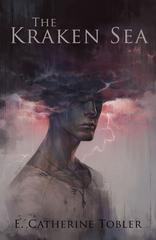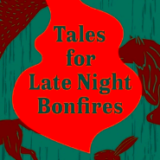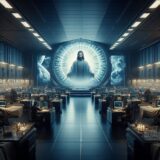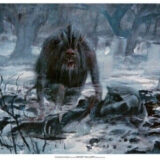An Introduction to Chain Mail
When Sue Lange (BVC) and I put our heads together to try and come up with something interesting, timely, fun AND do-able, we ultimately ended up with something interesting, timely, mostly fun and almost do-able. How much so I’ll leave to the reader to decide.
Sue played the dual roles of enthusiastic supporter and willing cat herder. The results, or lack thereof, are all my fault. My intentions were inspired by my desire to work with all of Book View Cafe’s wide-ranging talent, to get to know them a bit and in turn to hopefully get them excited about the impending return of Amazing.
I also consciously modeled the format after SFSignal’s Roundtable discussions, an interview series I have had the privilege of participating in on a number of occasions. (They are up for two Hugo Awards this year!) But I also had hopes of modifying the format.
I wanted to see some interaction between the various participants. I hoped to bring a bit of the give and take that one experiences while viewing a panel at a convention and maybe take advantage of the one skill every author is well versed in: the ability to take an idea and play.
The concept was pretty simple: give each author their own question to answer and then have them forward the question and their response along to the next author in line. A game of Telephone via email.
It sounded pretty good when I started out with six authors. By the time we reached 14, I had my fingers crossed.
Nevertheless, Sue persevered, reassuring me that everyone remained on board, happy and engaged. (Author Like Happy!). I don’t know how much of that was reality, wishful thinking or Sue’s dedication to her mission with the Book View Cafe, but I would like to take this moment to thank her.
Ultimately we all got through it. In future, I intend to try this format again, but I think we’ll stick to no more than half a dozen participants at any one time.
I’d like to thank everyone involved. I think we ended up with some interesting results and even managed to get a bit of a vibe going. I hope you will agree.
(Ed. Note: The author and book images are active links; author images link to biographical information, while publication images link to blurbs, blogs and backgrounds on the imaged material. Please take a moment or two to check them out. For additional information about the participants, please visit the Contributors Page.)
Amazing Stories: Is science fiction definable? If so, what is your definition?
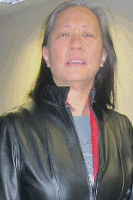
BRENDA CLOUGH
Well, if you think about it in evolutionary-tree form, SF is obviously a subset of fiction, which is a branch of fantasy — all fiction is to a greater or lesser extent fantasy. (And written fiction sits with written poetry, essays, and nonfiction in the great clade of Literature, which joins up to the big main trunk of Art — we can wave over the gap at our fellow creators in Quilting or Headbanger Punkadelic or Classical Ballet.)
Does SF have to include technology and the impact of technology? This seems to exclude things like DUNE by Frank Herbert, which would never do.
I kind of incline towards a wider definition that involves societal change, often driven by technology. This makes SF the primary way to experiment with ‘what if’ scenarios, and would allow us to include 1984 by George Orwell. A case could be made that SF is mostly a marketing definition. This would allow for why THE HANDMAID’S TALE by Margaret Atwood was not sold as SF even though it exactly meets the definition. If you go this route, then anything with a cover depicting space ships, aliens/planets, or a raygun can count as SF.
![]()

DEBORAH J. ROSS
What defines science fiction is more than the presence of certain elements — rockets and rayguns and robots, oh my. It has to do with the handling of those elements, of ideas and “what-ifs.”
For example, Audrey Niffeneger’s THE TIME TRAVELER’S WIFE does not feel like science fiction to me. Externally, it fits the category, but it fails to explore the implications of its central idea; in essence, it’s a narrowly intimate story that exists in a vacuum.
In film media, STAR WARS, for all its robots and starships, offers the sensibilities of a Western, but STAR TREK constantly plays with ideas and their human implications.

KATHARINE ELISKA KIMBRIEL
Yes, I think so. The best science fiction contains a sense of wonder, and the question “What If?” Occasionally you will see a science fictional story that leans heavily on one of these goal posts. STAR WARS, for example, is strongly in the Sense of Wonder camp. A “What If” movie might be 12 MONKEYS, which while bleak is definitely asking a lot of “What If?” questions. I think that BLADERUNNER contains both these narrative and thematic goals. Authors do not always write the same way for each idea they explore. They may choose to lean more heavily in one camp or another — or movie interpretations may change the emphasis of a story. Is the story TOTAL RECALL is based on as heavily in the “What If?” camp as the movie? Where do we put concepts like X-FILES?
My first SF novel, FIRE SANCTUARY, was born from two “What if?” inspirations. First the famous photos of the huge vegetables produced in fields near where the atomic bombs were dropped, and then a small article I read about wiring a bone break to a battery to speed healing. In my mind, two questions formed — “What if things could not only survive, but thrive in radiation?” and “What if the myth of the healing hands of a ruler were true?” The culture of Nuala was born.
I started with “What If?” but before I was through, I tried to give that world some of the awe and grandeur the best SF has always held.

PHYLLIS IRENE RADFORD
Years ago Science Fiction needed to have science as the core of the plot. Or what we now call hard SF. I’m thinking of Syne Mitchell’s work about gene therapy becoming a god send and pandemic nightmare. Futuristic stories with telepathy were considered just fantasy–telepathy was classed as wishful thinking, and therefore fantasy, no science involved. STAR WARS and STAR TREK are fantasy because they are character driven stories about future societies. The science of warp drive and transporters were gimmicks and not part of the plot. Except when they broke. Even then the stories were about coping and working together to find a solution.
Life changes, business models change, publishing changes. As far as publishing is concerned what I said this morning may be obsolete by sun down. However, in the last ten years we’ve seen a lot of blending around the borders of all the genres, paranormal romance, futuristic mysteries, historical sciences. All the definitions have become blurred. Every genre seems to spin off more and more subgenres. Brenda’s analogy of a tree branching off into a multitude of twigs is apt. SF has become an entire shrub of its own.
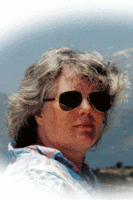
VONDA N. MCINTYRE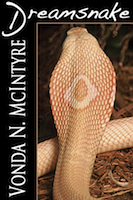
SF is a branch of fiction in which the author explores possibilities impossible in real life, but possible in another place or time, or with advances in knowledge or technology. Early SF was mostly about ideas; now a good deal of it is about how the ideas, changes, new technology affect the story’s characters.

JUDITH TARR
SF is what I’m pointing to when I say it.
I tend to see it as occurring in the future; if it occurs in the past, it probably got there by time machine, and/or the technology is at least as advanced as our own (but see below). It asks “What if?” and then takes a scientific approach to the answer: based on the scientific method, even if the science is not actually possible or even probable as we currently know it (FTL drives, anyone?).
I tend to see STAR TREK and STAR WARS as SF because of the space travel and the aliens and the reliance on a high level of technology. Saying they’re fantasy because they’re about people implies that SF isn’t, and that’s not how I see it.
I see DUNE as SF because [a] future, [b] space travel, [c] alien planets. The technology has branched ‘way off our contemporary view of it, but it’s definitely there, from stillsuits to Mentats to starships. It’s well on its way toward Clarke’s Law: “Any technology, if sufficiently advanced, may be indisitinguishable from magic.”
For that matter do I see McCaffrey’s PERN as SF? Actually I do. Alien planet again. The fact the inhabitants are at a feudaloid level of technology doesn’t remove the fact that the dragons are genetically engineered and the riders are human colonists. And they’re fighting alien invaders. Using psi and time travel. All dearly beloved SF tropes.
But then I wrote human mutants in a slightly alternate Middle Ages and got labeled Fantasy because [a] female writer, [b] Middle Ages, and [c] terminology of the time labeled them “elves.” Which they are actually not. My thinking and worldbuilding were based on contemporary science and the SF I had read all my life. The “magic” was psi, which I was reading in what then was considered SF, from such titles as PSI HIGH and Joan Vinge’s PSION to the likes of DARKOVER and, yes, DUNE.
THE TIME TRAVELER’S WIFE? Fantasy. No explanation for the McGuffin, it’s just there. It’s magical “realism,” similar in inspiration to THE CURIOUS CASE OF BENJAMIN BUTTON.
Because I’m pointing to it and that’s what I’m saying.

PATI NAGLE
Science fiction is always changing, hence pinning a definition to it is difficult. When I was a kid, SF seemed to be about adventure, exploration, and the afforementioned “sense of wonder.” The genre has moved away from that in recent decades, and I think that’s a loss. In the 60s, SF and the space program together inspired a lot of kids to seek careers in science. They desired to make real the imaginings of writers they enjoyed. I’d love to see that enthusiasm return.
Brenda and Phyllis both alluded to “hard” science fiction, in which technology itself is centrally important, as compared with “soft” science fiction, which I tend to think of as more about the social implications of technology. There are also the subgenres (cyberpunk, new wave, steampunk), some of which flower briefly and fade, others of which become accepted branches of the tree in Brenda’s analogy.
For the future, I think it important that science fiction writers should remain welcoming. By that I mean that they should write for new readers as well as for long-time fans of the genre. If we stop talking to anyone but ourselves, our impact will decrease to near zero.Passes.

DAVE TROWBRIDGE
Science fiction is easy to define. The hard part is getting someone else to agree with you.
As George S. Kaufman said, “One man’s Mede is another man’s Persian.”
The EXORDIUM space opera Sherwood Smith and I wrote has been enthusiastically accepted as science fiction by a community of military gamers, despite the occurrence of a frank miracle—no midi-chlorians or other hand-waving—that makes it fantasy as far as a Quaker friend of mine is concerned. On the other hand, I’ve never thought of Ray Bradbury as a science fiction writer—for me, he doesn’t scratch the same itch that SF does.
The nice thing is that such genre definitions are becoming less important as the Internet progressively reduces the friction built into publishing by the need to push physical objects around. The ongoing virtualization of the written word is churning publishing up into a kind of quantum froth that buds off new subgenres with fissiparous abandon. That same lack of friction makes it easier for readers to find science fiction—or any other genre—that scratches a particular itch, and thus for communities to form around new genres, and in the process define them.

SUE LANGE
For me, science fiction is a story set in a fantastic, yet plausible place. Someplace that doesn’t currently exist or that we haven’t found but could, because constructing it follows known laws of physics. It could be our future on earth, our future in space, an alien specie’s present, a past that we knew nothing about. Although some science fiction does incorporate elements of magic, It does not rely on magic alone to create the fantasy.
So now I have to define magic to make this definition stick. Magic is a plot device used to create a fantastic scenario that does not need to rely on physical laws.
You could make the case that FTL is at present a magical element. I think, though, using FTL in a story that the author defines as science fiction is legal because the assumption is we will discover a method for FTL in the future. This may turn out to not be true, but I believe the science fiction author that, with a straight face includes FTL in her story and demands that we take it seriously, truly believes FTL will one day be a possibility.
There is no requirement for magic to pass a physics test. The proof (or would that be poof?) is in the pudding. The spell is cast, the prince turns into a frog. There’s no description of the spell to let those who follow repeat the
experiment. It’s not necessary. It’s magic.Fantasy stories that are based on magic rather than science have their own rules to follow, but they aren’t physical laws.
Therein lies the difference between fantasy and science fiction. Therein lies my definition.

LINDA NAGATA
Is science fiction definable?
I suppose so, if you like a good argument. It seems to me that the definition changes depending on the era, the books being discussed, and the outlook of individuals, but here’s a very general definition:
stories with a speculative element that is attributed to technology, not magic. I’m sure exceptions abound, but for me, that’s a good starting place.

JENNIFER STEVENSON
In my view, science fiction is a state of mind, an opinion about the world, a religious view, if you want to be provocative–and science fiction prides itself on being provocative, though it likes to think it is the antithesis of religion. I trace its origins to the argument which Roger Bacon made in favor of science. Bacon’s environment was not friendly to science, a term which was in his day interchangeable with magic, and magicians were getting burnt up pretty regularly. Bacon was one of the first to try to differentiate science from magic. A founder of the spirit of science, he used Bill Murray’s argument in Ghostbusters: “Back off, man, I’m a scientist.”
In science’s defense, Bacon argued that magic meddles in things man shouldn’t oughta wanna wot of. Science deals with nature, which is beneath man, who is beneath God. According to that hierarchy, man might do what he pleased with nature. “I am come in very truth to leading to you Nature with all her children to bind her to your service and make her your slave.”
Science and technology don’t “merely exert a gentle guidance over nature’s course; they have the power to conquer and subdue her, to shake her to her foundations.”
Leaving the gender implications out of this discussion, I find here the forceful energy, the expansive survey of all creation as an inviting frontier, and the spirits of conquest and progress which make science
fiction what it is. Science fiction is an attitude toward the world; it describes a relationship with nature.
I find that science fiction has evolved around, but never far away from, this core argument of Bacon’s. Some authors dispute it, others subvert it, but Bacon is the primary. All later writers are his satellites.
I’m greatly indebted to Evelyn Fox Keller for her remarks on Bacon in “Baconian Science: The arts of mastery and obedience.”

MAYA KAATHRYN BOHNHOFF
Critic Lee Mortimer once defined science fiction as: A genre of escape literature which takes the reader to faraway planets — and usually neglects to bring him back.
As a writer of SF, I reject the idea that it’s escapist. I’ve taken Ray Bradbury’s words on the subject (which seem a direct rebuttal of Mortimer’s position) very much to heart:
“….the entire history of mankind is problem solving, or science fiction swallowing ideas, digesting them and excreting formulas for survival. You can’t have one without the other. No fantasy, no reality. No studies concerning loss, no gain. No imagination, no will. No impossible dreams: No possible solutions.
“…Fantasy, and its robot child science fiction, is not escape at all. But a circling round of reality to enchant it and make it behave….
‘… All science fiction is an attempt to solve problems by pretending to look the other way.”
Science fiction may be fantasy’s “robot child”, it is really about making reality behave by merely pretending to look the other way.

CHRIS DOLLEY
Science Fiction is Fiction with all the dials turned up to eleven.
Thus concludes our first ever Chain Mail. I certainly hope that you enjoyed it. I also hope that you took a moment or two to learn a bit more about the participants. The Book View Cafe is an author’s collective who are busily (and successfully) exploring the new horizons of our collective publishing future.
Don’t forget that the images included above are active links to more information and background on the individual authors and their works. For more information on Chain Mail’s participants, please visit the Contributors page.
Amazing Stories’ Chain Mail Telephone Tag by Email will continue on July 3rd. Now that we all know what Science Fiction is, we should probably continue our investigation by asking –
IS SCIENCE FICTION DYING?
I’m sure we all want to know….




